Cat Depression: Causes, Signs and Treatments
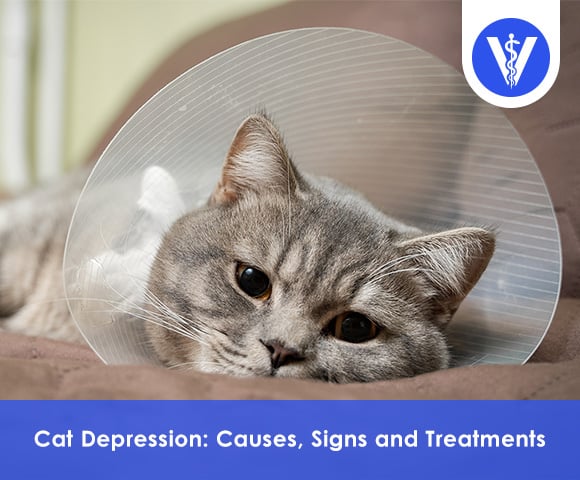
Table of Contents
Cat depression is a prolonged low-mood state in which the cat is disinterested in daily activities. Cat depression manifests in behavioral changes and altered sleep-wake cycles and appetites.
Mental health problems in pets are a controversial topic, and pet owners often wonder, “Can cats get depressed.” The simple answer is yes. Depression in cats is caused by changes in the environment, regimen, social group, boredom, and physical pain or disease.
Signs of depression in cats include destructive behavior, vocalization, house training mistakes, poor grooming, reduced appetite, clinginess, and irritability. The cat depression signs are not exclusive to low mood and are often mistaken for other medical problems.
Veterinarians diagnose mental problems in cats based on history information and cat depression symptoms. The treatment is multimodal and entails environmental, diet, and schedule changes combined with supplements supporting neurological health and antidepressants.
What is Cat Depression?
Cat depression is a serious mental health condition in which the cat is in an ongoing low-mood state and is disinterested in activities that once brought it joy.
Depression is defined as a “persistent feeling of sadness,” according to Mayo Clinic. Cat depression is a complex issue affecting physical and mental well-being and lowering the cat’s overall quality of life.
Depression in cats affects general behavior, sleep-wake cycle, and appetite. Depressed cats are reluctant to eat, which results in hepatic lipidosis. Hepatic lipidosis, or fatty liver, is a potentially fatal condition unique to cats. Cats develop hepatic lipidosis after an anorectic period of not eating for three to four days. Hepatic lipidosis has a mortality rate of over 90% if untreated.
What are the Causes why Cats Suffer Depression?
The causes of why cats suffer depression are listed below.
- New Family Members: Cats are naturally suspicious, aloof, and reluctant to accept new family additions. A new human baby or a new pet in the house is a widespread cause of depression in cats.
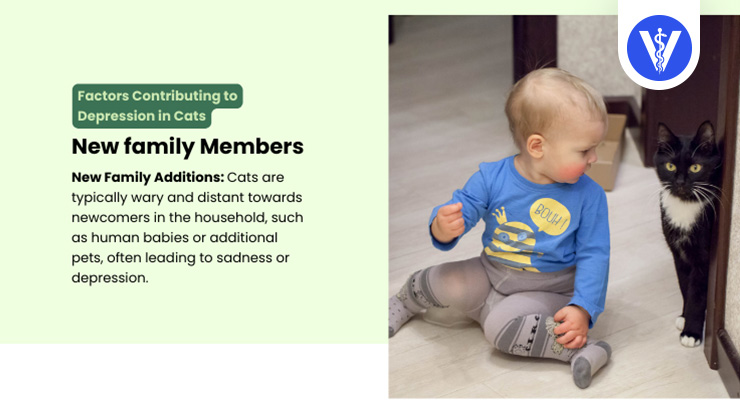
- Environmental Changes: Changes in the cat’s immediate living environment cause stress and depression. Environmental changes that trigger depression in cats include rearranging furniture or doing construction work around the house.
- Switching Houses/Apartments: Moving to a new house or apartment causes cat depression. Cats get closely attached to the living space and feel sad when moving. Cats are reluctant to adjust to a new living situation because it means forming new habits.
- Schedule Alterations: Cats are habitual animals. Small schedule changes affect mental health. Schedule changes that cause cat depression include serving breakfast at a different time, leaving for work, or coming home at a new time.
- Loss of a Companion: Cats grieve the loss of family members. Losing an owner or a pet companion, whether feline or canine, makes cats sad and depressed.
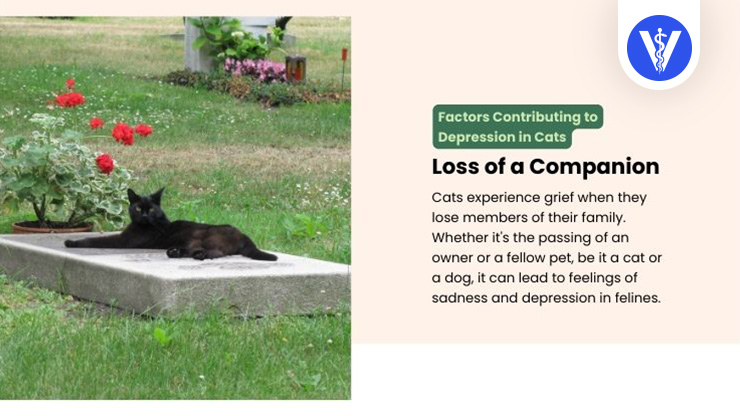
- Boredom: Cats are natural hunters and thrive on activities like lurking and chasing. Indoor cats lacking proper environmental enrichment and energy outlets are prone to boredom, which results in cat depression.
- Injuries and Diseases: Pain due to physical injuries and painful medical conditions, such as arthritis, kidney disease, periodontal disease, and upper respiratory tract infections, are causes of depression.
How is Depression Different from Anxiety in Cats?
Depression is different from anxiety in cats in presentation and duration. WebMD says that “depression causes feelings of sadness, hopelessness, and reduced energy,” while “anxiety creates feelings of nervousness, worry, or dread.”
Cat depression resolves within a few months with proper treatment, and cat anxiety is ongoing and requires continuous management.
Cat depression and anxiety are different, but the two conditions are able to co-exist in the same cat at the same time.
What are the Signs that your Cat is Experiencing Depression?
The signs that your cat is experiencing depression are listed below.
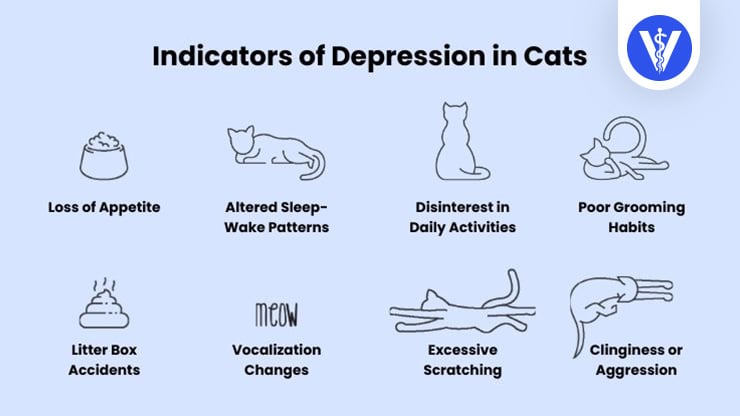
- Loss of Appetite: Reduced or completely lost appetite is a sign of depression but not definitive of cat depression. Depressed cats refuse to eat even if otherwise food-motivated.
- Altered Sleep-Wake Patterns: Cat depression affects the sleeping patterns, making cats sleepier than usual during the day and awake and unable to sleep at night. Pacing and vocalization during the night are signs of disrupted sleep.
- Disinterest in Daily Activities: A sudden lack of interest in daily activities is a significant sign of cat depression. Depressed cats refuse to be active and prefer to be left alone and sleep through the day.
- Poor Grooming Habits: Depressed cats are reluctant to groom themselves, resulting in poor coat quality and an unkempt appearance.
- Litter Box Accidents: Depressed cats are prone to litter box accidents, meaning they tend to urinate and defecate outside the box despite being trained to use it.
- Vocalization Changes: Changes in the cat’s vocalization habits are signs of cat depression. Quiet cats get more vocal and prone to meowing and crying when depressed, and vocal cats get quiet and withdrawn.
- Excessive Scratching: Scratching is a normal cat behavior and part of their territory marking tools. Excessive scratching is a sign of stress or cat depression.
- Clinginess or Aggression: Depressed cats become needy, cling to the owner, or become easily irritated and even aggressive.
What can you do for your Cat Suffering from Depression?
You can comfort, show love, and care for your cat suffering from depression. Simple ways to cheer up cats include giving tender love and care, spending quality time together, introducing new games or toys, and providing environmental enrichment.
Playing quiet music, catnip, pheromones, and calming supplements are effective in overcoming cat depression.
There is no universal approach to supporting cat depression because all felines are different and respond uniquely.
For example, if the cat has a low appetite when depressed, offer delicious treats or add food toppers to make the kibble more enticing. Cats refusing to groom require regular brushing to maintain coat and skin health until the low mood improves.
How can Veterinarians Diagnose Cats’ Depression?
Veterinarians can diagnose cat depression based on clinical signs and after ruling out other medical conditions. Diagnosing depression in cats is not simple because there is no specific test for low mood states in animals.
The veterinarian starts by taking the cat’s detailed history and then continues to perform a full body examination. The veterinarian orders additional tests and diagnostic procedures based on the initial findings.
The absence of an underlying physical condition mimicking sadness indicates cat depression as a potential diagnosis. The cat is referred to a veterinary behaviorist for a diagnosis confirmation and a more detailed analysis.
Can Cat Depression be Treated?
Yes, cat depression can be treated. Extra love and care, combined with changes in the cat’s diet, routine, and environment, is enough to treat mild cases of depression in some cats.
Severe depression in cats is treatable, too, but requires a complex and multimodal treatment strategy, including love and care or TLC, environmental changes, natural supplements, and prescription drugs or antidepressants.
What are the Treatments for Cat Depression?
The treatments for cat depression are listed below.
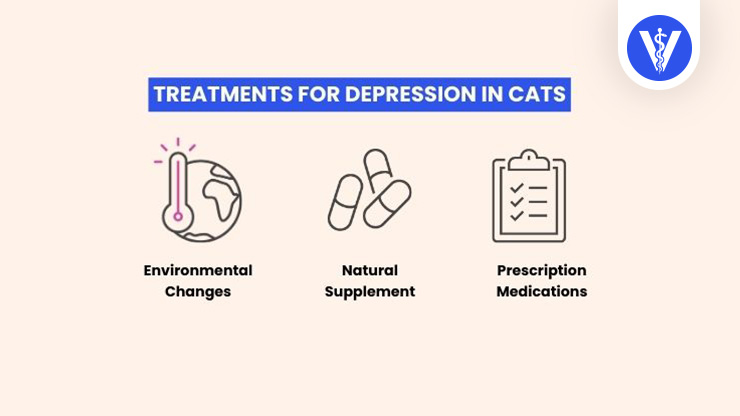
- Environmental Changes: Small changes in the cat’s environment, diet, and routine are effective in cat depression management. Create a safe and stimulating environment and a strict schedule. Cats are creatures of habit and thrive on structure.
- Natural Supplements: Popular natural supplements for cat depression treatment are omega fatty acids, catnip, and CBD oil. Fish oil is the best source of omegas, which has strong anti-inflammatory properties and boosts brain function. Catnip is stimulating for some cats. A mice study 2010, “Antidepressant-like effects of an apolar extract and chow enriched with Nepeta cataria (catnip) in mice,” found catnip has antidepressant features. CBD, or cannabidiol products, balance the brain’s chemicals, supporting a positive mood. CBD oils and treats are the most frequently used supplement forms for cats.
- Prescription Medications: Prescription antidepressants are used to treat severe cases of cat depression. Commonly used antidepressants are selective serotonin reuptake inhibitors (SSRIs), tricyclics (TCAs), and monoamine oxidase inhibitors (MAOIs). Never use antidepressants without the veterinarian’s approval, and adhere to the dosing instructions.
Can CBD Oil Treat Cats’ Depression?
Yes, CBD oil can treat cats’ depression. CBD, or cannabidiol, is a naturally occurring compound found in the Cannabis sativa plant, primarily in hemp. CBD works through the cat’s endocannabinoid system, supporting natural health and balance.

CBD is commonly used in the treatment of depression among humans. A survey of over 2.000 people showed that 1 in 6 use CBD for depression, and 75% of the users said CBD was positive in depression treatment. Cannabinoids were first mentioned as a potential depression treatment in 1621.
The use of CBD oil supplements for cat depression treatment is novel but shows promising results. The ECS in humans and cats works the same way, and the benefits of CBD for humans are expected in cats.
What are the Properties of CBD Oil that Help with Cat Depression?
The properties of CBD oil that help with dog depression are listed below.
- Serotonin-Like Effect: Cannabinoids interact with the 5-HT1A serotonin receptors and mimic the serotonin effects. Serotonin (5-hydroxytryptamine) is a neurotransmitter or brain chemical mediating satisfaction and happiness. Serotonin is called the “happy hormone.”
- Neurological Health Support: CBD for cats has potent and proven anti-inflammatory, antioxidant, and neuroprotective properties, helping with neurological problems. Cannabinoids boost cognitive function and help balance the chemicals in the cat’s brain to relieve cat depression.
- Pain Relief: Depression is often caused or accompanied by pain, and managing pain helps with low mood. CBD provides pain relief in cat depression by interacting with TRPV1 receptors, inhibiting anandamide deactivation, and mimicking the effects of the “happy hormone” serotonin.
- Anxiety Management: Anxiety is an integral part of cat depression, and easing stress aids in mood improvement. The anxiolytic and panicolytic effects of CBD for cats are shown and proven. CBD promotes natural calmness and relaxation and shows potential as a novel anti-anxiety and cat depression therapeutic.
- Boosted Gut Health: The microbiota-gut-brain axis affects moods. Cannabinoids, in small doses, act similarly to probiotics, supporting healthy gut bacteria and boosting digestive health, positively impacting the microbiota and gut, which affects the brain.
What are the Benefits of CBD Oil for Cats?
The benefits of CBD oil for cats are listed below.
- Natural Support: CBD is sourced from the hemp plant and provides natural support for cat depression. CBD oil for cats is safer and has fewer adverse effects than traditional medications. High-quality pet CBD products are made with organic ingredients, extracted with supercritical CO2, and free from harmful chemicals, additives, and preservatives.
- Wide Safety Margins: CBD for cats has wide safety margins. Cannabinoids suit cats of all ages, including kittens over four months old, adults, and senior cats. Cats do not overdose on hemp-sourced pet CBD, and cannabinoids are non-addictive, non-psychogenic, and safe for daily use.
- No Serious Side Effects: Cat CBD does not cause serious side effects, even when used long-term. Benign and temporary CBD side effects are expected when starting the cat on CBD. CBD side effects resolve when the cat gets used to the supplement and the right dose is determined. Prolonged CBD use for cat depression does not cause tolerance.
- Easy Dosing and Use: CBD for cat depression is very simple to dose and use. CBD products have many strengths and come in different forms, like oils, treats, and powders. Some brands add cat-friendly flavors like chicken and bacon to cover the earthy flavor of cannabinoids.
- Available OTC: Hemp-sourced pet CBD contains less than 0.3% THC and is over-the-counter in pet stores and online. CBD does not require a veterinary prescription, but it is recommended to consult a veterinarian to ensure the oil is safe and beneficial for the cat’s depression.
- Many Health Benefits: Balancing mood is one of the many benefits of CBD to animals. Cannabinoids promote overall health, boost immunity, and strengthen cognition while aiding the treatment of various cat conditions like allergies, arthritis, anxiety, kidney disease, cancer, and seizures.
What are the Side Effects of CBD Oil for Cats?
The side effects of CBD oil for cats are listed below.
- Lethargy: Lethargy is a common adverse event of CBD in cats and manifests with reduced energy levels, increased sleepiness, and lack of interest in daily activities.
- Dizziness: Dizziness in cats results in loss of balance and lack of coordination and is linked to low-quality CBD oils containing more than 0.3% THC or tetrahydrocannabinol.
- Lip licking and Drooling: Cannabinoids alter saliva production in cats, causing drooling or hypersalivation accompanied by frequent lip licking when used in cat depression.
- Vomiting: Vomiting is a common CBD side effect and is seen in cats with sensitive stomachs during cat depression.
- Diarrhea: Diarrhea in cats results in loose and frequent stool and is triggered by the carrier oil in the CBD, more often by MCT or medium chain triglyceride coconut oil rather than hemp seed oil.
- Upset Stomach: Stomach upset is an expected side event associated with all new supplements and manifests with vomiting, diarrhea, and temporary appetite loss when used for cat depression.
- Liver Enzyme Changes: CBD alters the production of the liver’s cytochrome P450 enzyme, affecting the metabolism of drugs used to treat cat depression.
- Increased Tremors: Increased tremors in terms of intensity and frequency are seen in people but are an infrequent adverse effect of CBD products for cat depression.
- Increased Itchiness: Intense itchiness in scratching, biting, and licking is a rare but possible result of CBD for pets and develops in some sensitive cats.
- Low Blood Pressure: Hypotension or low blood pressure is one of the common side effects of CBD to animals, especially when cannabinoids are given in very high doses
How to Use CBD Oil for Cat Depression Treatment?
To use CBD oil for cat depression treatment, follow the steps listed below.
- Talk to the Vet about CBD Oil. Consult a veterinarian to ensure CBD is a beneficial and safe choice for the cat’s depression. Cannabinoids interact with certain antidepressants, and simultaneous use is inadvisable.
- Buy a High-Quality Pet CBD Oil. Always buy CBD products made specifically for pets and manufactured by trustworthy brands. CBD pet products must contain less than 0.3% THC. A reliable pet CBD brand is transparent, has positive customer reviews, and has the Certificates of Analysis (COA) for its cat depression products on its official website.
- Get the Correct CBD Oil. CBD oils for treating cat depression are available in many formulations, strengths, and flavors. Choosing the right form, potency, and flavor ensures optimal effect, simple dosing, and easy use, even in cats with picky appetites.
- Start with a Low CBD Oil Dose. Start with a small CBD amount, the lowest dose recommended for the cat’s body weight, and introduce CBD oil for cat depression gradually. Slow and gradual introduction allows the cat to adjust to the supplement and reduces the risk of unwanted side effects.
- Find the Best CBD Administration Method. Give the cat CBD oil directly in its mouth, preferably under the tongue (sublingually) or mixed with food. Serving CBD oil with food slows down the absorption of cannabinoids but is simpler for cat depression.
- Consider a Pet CBD Oil Alternative. Cats with delicate palates reluctant to consume CBD oil require an alternative dose method. Alternative pet CBD products are CBD treats. Many pet CBD brands offer treats and soft chews infused with cannabinoids.
- Be Consistent with the CBD Use. Be consistent with CBD use for cat depression. Cannabinoids need time to build up in the cat’s organism before achieving visible effects. Consider dosage modification if there is no improvement in the cat’s condition after four to six weeks of consistent use.
How Much CBD Oil can I give to my Cat?
You can give your cat between 2 and 4 milligrams of CBD per 10 pounds of body weight. Start with CBD doses for cat depression on the low end of the spectrum to minimize the risk of side effects. Cats do not overdose on cannabinoids, but high amounts trigger adverse events in some cases.
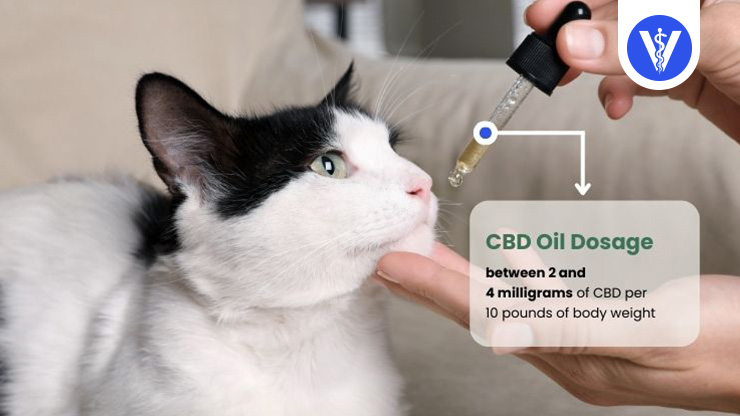
The low end of the dosing spectrum means around 2 mg per 10 pounds or 0.2 mg per pound. For example, the recommended starting dose for a cat weighing 8 pounds is 1.6 mg of CBD, while a cat weighing 15 pounds requires 3 mg of CBD.
Gradually increase the dose as the cat gets used to the CBD supplementation. CBD dosing is not a strict science, and different cats respond uniquely. Consult the vet or use a CBD dosage calculator to determine the right dose.
What are Preventive Measures to Avoid Cat Depression?
The preventive measures to avoid cat depression are listed below.
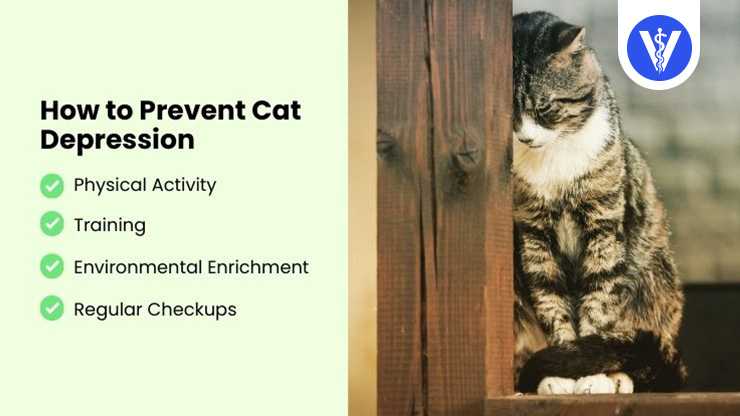
- Physical activity stimulates the cat’s body and mind. Daily leash-walking mixed with vertical climbing toys and short, interactive playtime sessions satisfy the exercise requirements for cats and avoid cat depression.
- Training builds cat confidence and reduces the risk of low moods and depression. Teach the cat new tricks as a form of brain stimulation.
- Environmental enrichment helps prevent cat depression and includes interactive cat toys, puzzles, cat mazes, vertical spaces, window perches, scents, and foraging games.
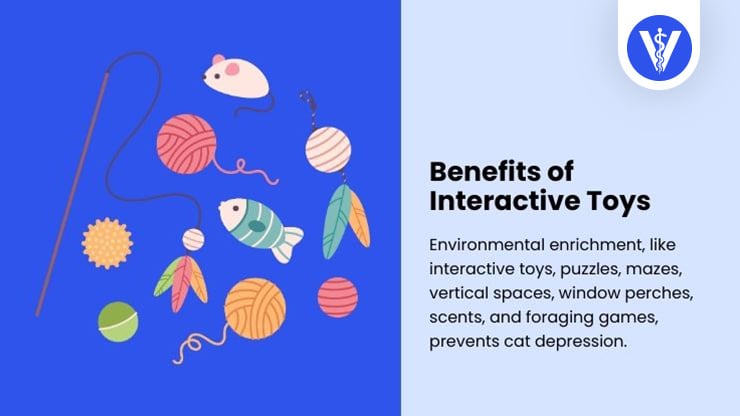
- Schedule regular vet checkups and do not miss appointments. Frequent veterinary exams allow for assessing the cat’s health and diagnosing health conditions like cat depression before they become more severe.
Does Exposure to Other Cats Allow Them to Overcome Cat Depression?
Yes, exposure to other cats allows depressed felines to overcome the low-mood state in some cases. For example, exposure to other cats benefits cats suffering from depression due to losing a companion.
Exposure to other cats or getting a new cat in the house makes things worse if the cat’s depression has other underlying causes and the depressed cat refuses social interactions with other felines. Consult a veterinarian before introducing a new cat to a cat with depression.
Is CBD Oil Safe for Cats?
Yes, CBD oil is safe for cats. Hemp-sourced CBD oil made exclusively for pets is safe when used responsibly. Pet CBD is non-psychoactive, non-addictive, and safe for all cats and kittens over four months of age.
CBD for cat depression is a novel and holistic therapeutic. The answer is yes for cat owners wondering, “Is CBD safe for animals?”
The Journal of Veterinary Pharmacology and Therapeutics in 2022 published “Pharmacokinetics of escalating single-dose administration of cannabidiol to cats” in 2022. The authors studied the effects of escalating oral CBD doses in cats and found that CBD is “safe and well-tolerated.”
“Scientific Validation of Cannabidiol for Management of Dog and Cat Diseases,” published in Annual Reviews of Animal Biosciences in 2023, found similar results. The study stated, “CBD appears to have good bioavailability and safety profile with few side effects.”
Can Cats Get Depressed?
Yes, cats can get depressed. Cats are susceptible and experience low moods when triggered by sad events.
Spotting mood swings and depression in cats is challenging. Cats have subtle facial expressions and body language. Felines are naturally more withdrawn, making it harder for owners to notice cat depression.
Cat depression is more straightforward to spot in outdoor cats spending a lot of time in the house and cats with outgoing personalities who suddenly get timid or irritable.
















